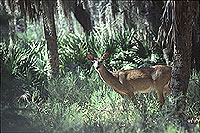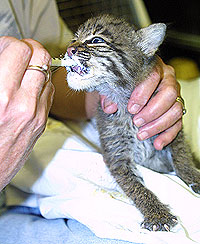Animals and Plants:
Human Use
In This Section:
Hunting and Fishing | Wildlife Watching | Scientific Research | Wildlife Rehabilitation
People have inhabited Florida for at least 10,000 years. The first people lived off the land, hunting, gathering, fishing, and farming. We know nothing of their feelings or beliefs about the plants and animals around them. We can only guess at the reasons for putting teeth of big carnivores -- bear, wolf, and panther -- in burial mounds. Did they represent material wealth, like our $100 bills, or were they symbols of something else?
 White-tailed deer provide thrills for wildlife watchers and dinner for hunters, but they can also be considered nuisances when they eat crops in farm fields and suburban gardens. (photo by Karla Brandt) |
A recent economic analysis conducted by the Florida Fish and Wildlife Conservation Commission (FWC) concluded that hunting, fishing, and wildlife viewing generated over $5.5 billion dollars in retail sales in 2003 with the creation of over 105,000 jobs. Clearly, human usage of Florida's native biological resources is a big-time industry. (myfwc.com/economic/FWC_Economic_Impact_2003.pdf)
Hunting and Fishing
Recreational Hunting and Fishing
In a 1996 study by the U.S. Fish and Wildlife Service, it was estimated that 54% of Floridans fished and that 6% of Floridians hunted. Freshwater anglers are usually fishing for crappie, panfish, any one of several species of bass, or catfish. Saltwater
anglers are often fishing for striped bass or seatrout but a wide variety of saltwater fish are being sought. The majority of hunters are deer hunters.
In Florida, hunting and fishing are regulated by the Florida Fish and Wildlife Conservation Commission (FFWCC) in the State of Florida. The FFWCC maintains various websites with information on licensing and regulations for these activities. The main website is located at www.myfwc.com.
Hunting Licenses:
myfwc.com/license/ and wildflorida.org/hunting/
These Florida Fish and Wildlife Conservation Commission websites contain information about obtaining a hunting license in the state of Florida, hunting regulations, safety courses, hunting seasons, mobility-impaired hunts and other hunting related topics.
Freshwater Fishing Information:
myfwc.com/fishing/
The Florida Fish and Wildlife Conservation Commission's Freshwater Fishing website contains information on rules, licenses, fishing tips, boat ramps, fishing piers, event schedules and other freshwater fishing related topics.
Saltwater Fishing Information:
marinefisheries.org/license.htm and myfwc.com/marine/
These Florida Fish and Wildlife Conservation Commission websites contain information about recreational saltwater fishing licenses, for-hire licenses and various other saltwater licenses required in the state of Florida.
Federal rules for recreational fishing in the Gulf of Mexico:
www.gulfcouncil.org/fishrules.htm
This site provides information on federal regulations, which may vary from the state rules, when fishing in U.S. federal waters of the Gulf of Mexico.
To report federal fishing violations call toll-free 24-hour hotline at 1-800-853-1964.
Fishing Line Recycling Program:
The Monofilament Recovery and Recycling program (MRRP)
www.fishinglinerecycling.org/aboutmrrp.htm
Monofilament fishing line causes problems if left in the environment. The Monofilament Recovery and Recycling program (MRRP) was created to encourage recycling of this nylon fishing line at a network of recycling bins and drop-off locations, as well as to encourage volunteer monofilament line cleanup events. This website gives information about the problems that monofilament fishing line creates in the environment and offers solutions to these problems.
To Report a Wildlife Violation:
www.myfwc.com/law/alert
Call 1-888-404-FWCC (3922) toll-free if you suspect a wildlife law violation. Examples of violations include: using illegal methods of fishing, boating under the influence, illegal hunting, killing or capturing of protected species.
Commercial Fishing
Commercially, the figures are impressive as well. In 2001, the last year the numbers were calculated by the National Marine Fisheries Service, an arm of the U.S. Department of Commerce, Florida ranked sixth nationally in the value of commercial catches alone-at $195 million. This market value hardly reveals the true economic impact of commercial fishing to the Sunshine State. When salaries, taxes, capital investments and so forth are factored in, Florida's seafood trade amounts to a business worth $2.3 billion, according to a 2001 study by University of Florida economists.
www.research.fsu.edu/researchr/summer2003/sidebar_bottomline.html
A more recent study by the Florida Fish and Wildlife Conservation Commission (FWC) put the economic impact of commercial fishing at just under $500 million dollars, with the seafood processing sector from those catches providing an additional economic impact of over $540 million dollars. An estimated 12,800 jobs are provided by this industry.
myfwc.com/economic/FWC_Economic_Impact_2003.pdf
Commercial Saltwater Fishing Information:
marinefisheries.org/CommLicense.htm
This FFWCC website contains commercial fishing licensing requirements for marine species, application forms, regulations and other information pertaining to the commercial fishing industry in Florida.
Wildlife Watching
A recent study by the FWC put the economic impact of wildlife viewing at just under $1.8 billion dollars annually. This is a figure that is over twice as large as that for hunting but is still substantially less than that for either fresh or saltwater fishing. myfwc.com/economic/FWC_Economic_Impact_2003.pdf
In addition to bird watching, wildlife watching includes traveling to various destinations for to view other biological species (e.g., plants, butterflies) as well as nature photography.
myfwc.com/viewing/
The Florida Fish and Wildlife Conservation Commission's “Wildlife Viewing” website lists areas around the state that are excellent for observing wildlife. Observation areas in the Apalachicola River (ARROW) region include:
Apalachicola National Forest
Florida Caverns State Park
Ochlockonee River State Park (birding hot spot)
St. Joseph Peninsula State Park (birding hot spot)
St. Marks National Wildlife Refuge (birding hot spot)
St. Vincent Island National Wildlife Refuge
St. George Island State Park (birding hot spot)
Wakulla Springs State Park and Lodge
This site also includes a monthly calendar that lists wildlife activities occurring throughout the year in Florida, as well as other topics such as observing wildlife with your children, locating a particular species, attracting wildlife to your backyard, environmentally friendly landscaping, Great Florida Birding Trail and a publications listing.
Nuisance Wildlife/Critter Questions:
wld.fwc.state.fl.us/critters/default.asp
This Florida Fish and Wildlife Conservation Commission's Critter Questions website answers questions regarding Florida wildlife, how we can learn to live with them and protect them. Nuisance problems for several species are discussed in the Wildlife Resources Handbook information section (go to the “more information” section after selecting a species from the blue sidebar on the left-hand side of the screen).
Wildlife Information:
edis.ifas.ufl.edu/TOPIC_Wildlife
This University of Florida IFAS Extension Service (EDIS) website covers numerous topics on wildlife including landscaping for wildlife, nuisance wildlife, wildlife by species, and management and conservation of wildlife.
Scientific Research and Collecting
Anyone collecting wildlife for scientific research purposes must possess a scientific collecting/research/educational use permit. Contact the Protected Species office of the FWC for permitting questions and the regional office of FWC for technical assistance.
Protected Species Department
Florida Fish and Wildlife Conservation Commission
Bureau of Wildlife Diversity Conservation/Protected Species Department
620 South Meridian Street, Mail station WLD-BLX
Tallahassee, Florida 32399-1600
(850) 921-5990, ext. 17310
Northwest Region-FWC
3911 Highway 2321
Panama City, FL 32409-1658
(850) 265-3676
Anyone collecting plants within the Apalachicola National Forest will also need a collecting permit. Contact the following USDA Forest Service office for assistance on obtaining a permit:
Tallahassee Office - USDA
Apalachicola National Forest
US Department of Agriculture
325 John Knox Rd, Suite F-100
Tallahassee, Florida 32303
(850) 523-8500
Wildlife Rehabilitation
With an average of 900 people moving into Florida each day and land being developed at a tremendous rate, our native wildlife is losing the wild places that it once called home. As these creatures flee from their natural habitat they face many dangers as they attempt to find the food, water, shelter and space that they need to survive. Records show that the majority of wildlife injuries are human related (hit by cars, injured by a frightened or misinformed homeowner, unintentionally poisoned by the spraying of pesticides on a lawn, killed by a pet cat or dog, blinded by a child “playing” with a BB gun).
 An abandoned bobcat kitten must be fed by hand (photo by Karla Brandt) |
The goal of a Wildlife Rehabilitator is to treat the animal and release it back into the wild so that it can live its life as nature intended. Occasionally the animal cannot be released due to injuries that do not heal or because it has imprinted on humans. These animals must be kept in captivity and many times are used as educational animals to teach the public about wildlife, the problems they face and how they can be helped.
Florida Wildlife Rehabilitators and FWC Contact List (Northwest Region)
Florida Fish and Wildlife Conservation Commission-Wildlife Alert Reward Program Call 1-888-404-FWCC (3922) toll-free if you suspect a wildlife law violation. The website address is www.myfwc.com/law/alert.
Northwest Region-FFWCC
3911 Hwy. 2321
Panama City, FL 32409-1658
(850) 265-3676
24-Hour Law Enforcement:
(850) 233-5150
Calhoun County (Altha) (850) 762-8685
Betsy R. Knight (Executive Director)
Big Bend Wildlife Sanctuary, Inc.
Specialty: black bears; Birds of Prey educational program
bbws1@digitalexp.com
Comments: Accepts all injured, sick, or orphaned Florida wildlife.
Franklin, Jefferson, and Wakulla counties (850) 926-8308
Chris Beatty, Director
Florida Wild Mammals Association, Inc.
www.wakullawildlife.org/
Specialities: mammals, birds (all species), reptiles; educational program for schools
Gadsden County (850) 386-6296
Jon Johnson, Executive Director/Wildlife Rehabilitator
St. Francis Wildlife Association, Inc.
jonjohn@electro-net.com OR www.stfranciswildlife.org/
Specialities: raptors, reptiles, all native wildlife
Gulf County (Port St. Joe) (850) 647-8238
Barbara Eells, licensed wildlife rehabilitator
pelican@gtcom.net
Wildlife Species: shorebirds, raptors, songbirds, mammals, reptiles
Gulf County (Port St. Joe) (850) 229-1065
Marie Steele-Romanelli, President/Director
St. Joe Wildlife Sanctuary & Educational Center
info@StVincentIsland.com
Wildlife Species: shorebird rehabilitation
Nuisance Wildlife
Occasionally wildlife can become a problem for homeowners and may need to be removed (for example: snakes found in swimming pools, raccoons living in attics, or bears rummaging through garbage cans). The Florida Fish and Wildlife Conservation Commission (FFWCC) authorizes nuisance wildlife trappers to remove destructive or nuisance wildlife from private property with the permission of the property owner, usually for a fee. A listing of licensed trappers in the northwest region of Florida can be found at myfwc.com/trappers/NorthwestTrappers.pdf.
These trappers are not authorized to take nuisance alligators. Please refer to the nuisance alligator information found at wildflorida.org/gators/nuisance.htm or contact the nuisance-alligator coordinator in the FFWCC Northwest Regional Office at (850) 265-3676 for more information.
Note: Nuisance trappers taking venomous reptiles are required to have a venomous reptile license.
Note: The content of the website has not been updated since 2005. The site remains online for it's value as legacy content and is unlikely to be updated.